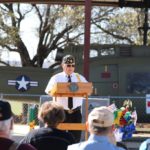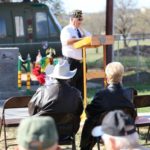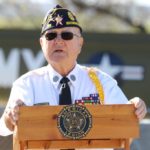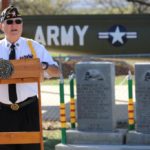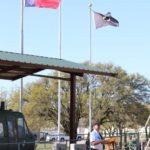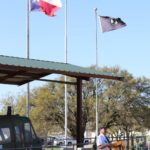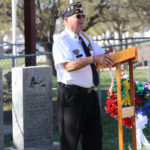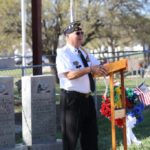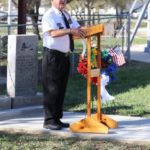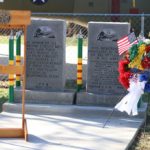Monday morning at the Central Texas Veterans Memorial, National Vietnam War Veterans Day was recognized marking the anniversary in which U.S. Military Assistance Command, Vietnam, disestablished – March 29, 1973.
The ceremony honored the 11 Brown County servicemen who lost their lives in Vietnam:
- Raymond Rodriguez Delgado
- Eddie Lee Ephraim
- James T. Griffin Jr.
- J.D. Harrell
- Phillip Hease Holmes
- Arthur Earl Keesee
- Brit P. Lemmons
- Williard Alton Perry Jr.
- Michael Autrey Teague
- Nelson Payne Tuttle
- Kenneth Wayne Wheeler
Colonel Tom Gray spoke about the Vietnam War and the impact it had on the country then and now.
The following are excerpts from the speech Gray delivered to those in attendance:
It was not a very popular war. I know when I came home there were no ticker tape parades, there were no groups of people waving American flags. Nobody came up to me and said thank for your service, thank you for what you did. There were protesters across this country and if you were one of the ones who flew through San Francisco, you met some of those protesters using all kinds of profanity against you after you’ve been in combat for 12 months, lost friends, lost soldiers during that time. You were looking at these people, your own countrymen, and it was sad. It had a profound impact on me for a long time.
You ask how in the world did we get into this conflict in the first place. The French went into Vietnam in the 1800s and controlled it until World War II came along and the Japanese moved in and occupied Vietnam. With the signing of the unconditional surrender, the Japanese withdrew their forces and when they did that opened up the window for a North Vietnamese man named Ho Chi Minh, and he formed a political group called the Viet Men, whose purpose was to unify Vietnam under Communist rule.
The Viet Minh, along with the Viet Cong, fought the French and the French made a tactical mistake and setting up their defenses in a valley so the North Vietnamese forces surrendered them and the French surrendered and withdrew from Vietnam in 1955.
In 1955 you had two superpowers in the world, the United States of America and the Soviet Union. It was our aim to keep Communism from spreading around the world. We began to get involved with South Vietnam by providing soldiers and equipment.
In 1964, Congress passed the Gulf of Tonkin Resolution, which gave President (Lyndon) Johnson to use whatever military force he thought necessary against Vietnam. It wasn’t a declaration of war, but he had that resolution and authority. Shortly after that there were 500,000 servicemen in South Vietnam. The last military forces left there March 29, 1973.
During that time there was a little over 2.7 million servicemen that were stationed in South Vietnam. Of that number, there were over 58,200 killed in action. Wounded in action were 303,704, with 75,000 of those seriously disabled. A lot of those were what we called booby traps in those days, now they’re called IEDs. Of that 2.7 million, 7,484 were women that served in Vietnam. The POWs were 766 of which 114 died in captivity. We still have well over 2,000 missing in action that we’re still trying to locate and come to a conclusion to what happened to them so their families know.
It was a not so good war. I know when I came home, the way this country was, one of the biggest things that turned the country against the war happened in 1970. All across the country, particularly at college campuses, they were protesting against the war. At Kent State, students were protesting and the National Guard was called out. Heaven only knows why they gave them live ammunition, but they did, and they opened fire on those students killing four and wounding nine. That was the real turning in this country, turning the United States against the war.
With the peace agreement agreed upon in Paris, we withdrew. In my opinion we lost. We didn’t achieve what we should have, but I know the military commanders and even the politicians learned a lot from that war which were applied to Desert Storm and that made it a success.

